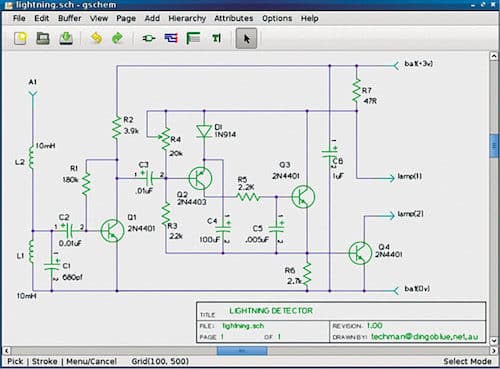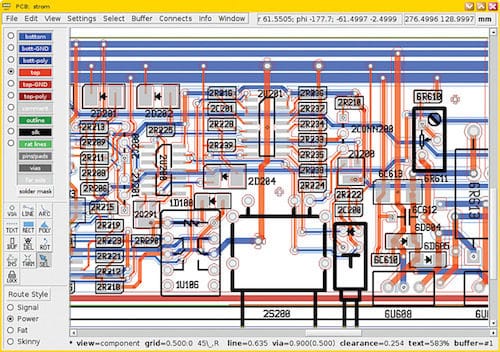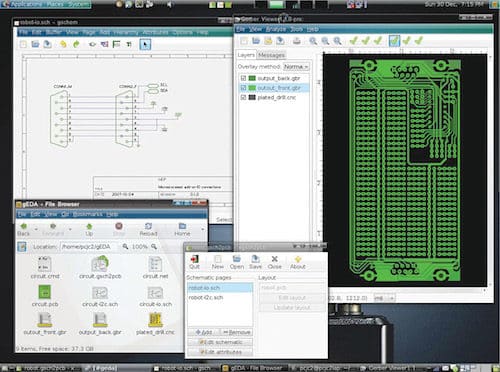When there was no free electronic design software available for Linux and Unix users, gEDA, or GPL-Electronics Design Automation, project took the initiative to cater to the needs of PCB designers. Today, gEDA is one of the most popular collections of open source software tools for electronics circuit design, licensed under GPL. Circuit designers get access to a complete set of tools that are generally required by them.
The tools are useful for operations like schematic design and capture, netlisting, PCB layout creation, circuit simulation, prototype generation, bill of material generation and production, among others. Since gEDA software collection was primarily aimed towards Linux and Unix platforms, all tools run seamlessly on these operating systems. Most tools are also compatible with Mac OS X. Windows users, too, get some tools that are compatible with the platform.

Components of gEDA
gEDA suite comprises the following tools.
gEDA/gaf
gaf (short for gscheme and friends) is the original gEDA project tool created by the team. It is a subset of various important tools that are maintained by the core gEDA development team. Tools in the subset are described below.
gschem is the main circuit schematic capture program of gEDA tool. It has a compact user interface (UI) with many functionalities. Schematics can be drawn on the workspace. Various quick access buttons on the UI enable easy usage of the tool. All components and connections drawn are captured by the tool. gEDA suite stores the netlists of the schematics for further operations.
gnetlist is the suite’s program to generate netlists of the various components and connections used in the schematic creation tool. It supports more than 20 netlist formats.
gsymcheck is the default syntax checker of the program.
Symbol attributes can be edited on gattrib spreadsheet program.
Libgeda is the gEDA library collection for gschem, gnetlist and gsymcheck.
gsch2pcb suite is responsible for forwarding annotations from the schematic to the layout tool.
PCB
This is the main PCB layout creation program of gEDA suite. It is suitable across all four major platforms (Unix, Linux, Windows and Mac). The tool comprises a gamut of features, including schematic/netlist import, check design rules, auto-router and trace optimiser to reduce layout time.
For board fabrication and assembly operations, the tool can generate a variety of outputs like RS-247X (Gerber) data, NC drill and Centroid data. It can also be customised as required.

gerbv
gerbv is the gerber file viewer of gEDA. gerber is the standard data format for PCB design operations.
NgSPICE
This is a circuit simulator for digital mixed-signal circuits. The created circuitschematic can be simulated on this tool to check the functionalities. The tool is compact, and easy to understand and use. The interface front-end is based on gspiceui setup.
GTKWave and gwave
Along with circuit simulation, gEDA also a brings a digital waveform viewer tool, GTKWave, and an analogue waveform viewer, gwave. GTKWave is compatible with Unix, Linux and MacOS. Supported input file types include LXT, LXT2, VT, FST and GHW. Standard Verilog VCD and EVCD files can also be read.

Icarus Verilog
This is a compilation and simulation tool for source codes written in Verilog data. Its main target platform is Linux, but it is compatible with other similar operating systems as well.
Operations and latest features
The main flow of circuit creation on gEDA starts from schematic production on gschem. A netlist is created from the schematic, and attributes are passed on to the PCB (through translation by gsch2pcb). After necessary changes and customisations, the digital circuit can be evaluated on the simulation suites.
gschem suite features a large number of functions and utilities for various operations, like symbol checkers and symbol customisations, format conversion, attribute editing and so on. Schematics also support hierarchical design.
The latest version of the PCB layout tool has seen many improvements in terms of bug fixes like UI upgrades and dependency modifications. All other tools are provided as per their latest updated iterations.
gEDA has a strong community presence, drawing support from various open source projects. Documentation is available on www.geda-project.org. It is, overall, a complete suite that is highly scalable due to all the assembled open source tools. gEDA suite can be a great companion for electronics enthusiasts of all kind—students, hobbyists or professionals.









